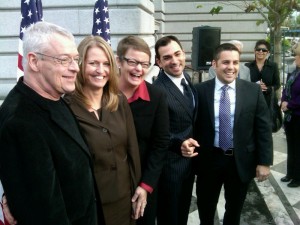
The California Supreme Court has decided that it will hear the issue of whether proponents of Proposition 8 can stand in to represent voters when the state refuses to do so. The schedule that the court has set for filing briefs indicates the case will stretch well into September or beyond.
(Full announcementfrom the court below.)
In January the Federal Ninth Circuit Court of Appeals punted the case -- Perry v. Schwarzenegger -- to the court by asking for guidance on a highly unusual issue -- whether proponents of a California ballot measure have "standing" -- the legal right to sue due to sufficient impact on them by the matter at hand -- when the state in the form of elected officials has declined to take up the case.
The officials in this case were Attorney General Jerry Brown and Governor Arnold Schwarzenegger, who refused to defend the lawsuit, which was filed on behalf of two same-sex couples denied marriage licenses.
U.S. District Court Judge Vaughn R. Walker then decided for the plaintiffs, ruling that Proposition 8 violated the Due Process and Equal Protection clauses of the 14th Amendment, and was therefore unconstitutional.
The defendants, the sponsors of Proposition 8, then filed an appeal. (That hearing was broadcast on radio and TV, and you can listen to an archive of it here.)